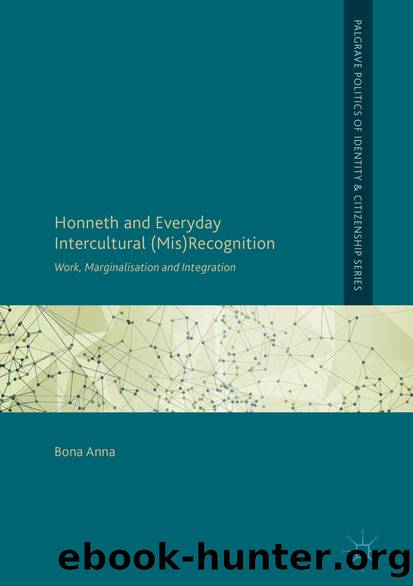Honneth and Everyday Intercultural (Mis)Recognition by Bona Anna

Author:Bona Anna
Language: eng
Format: epub
Publisher: Springer International Publishing, Cham
Conclusion
Chapter Five has investigated intercultural (mis)recognition as it is shaped by ethno-racial identification, that is, ‘who one is racially and ethnically’, in everyday work contexts. It presented phenomenological samples of ethno-racial misrecognition narrated by Pacifica workers during fieldwork. The analysis identified ways in which old and new modes of such micro level marginalisation at work, specifically overt insult, stereotyping, territorial domination and border closure, mirror enduring structures of inequality at mezzo and macro levels. It also discussed the significant disruptive consequences of racial marginalisation for the workers’ identification as workers, and the corrosive impacts on the norms of paid work. The chapter delineated some of the responses to ethno-racial disrespect at work, such as disempowering shame and self-negation. But just as importantly, it also fleshed out some of the complexities of adaptive agency, the ways in which Pacifica workers attempt to rehabilitate the normative claims of work. Some of these restorative scripts include righteous indignation, oppositional anger, ignoring silence, moral superiority, bureaucratic intervention, a philosophical stance, humour, appeals to alternative recognition audiences, career advancement and success at work. For workers of the second generation particularly, successful work performance and professional identity itself represent a strong platform for self-assertion to counteract everyday racist denigration at work. However, there is the question regarding the extent to which restorative agency undermines the potential for collective action that might lead to a struggle for recognition aimed at changing the existing recognition order.
Ethno-racial misrecognition is not unique to the domain of paid work, emerging as it does in many social contexts. However, it is of particular significance in the work domain because, as established in Chapter Four, paid employment remains a primary means of individual and societal integration. Specifically, misrecognition of ‘who one is racially and ethnically at work’ interferes with the esteem recognition workers deserve for their legitimate achievements and contributions through work, and the sense of meaningfulness that may flow from these resources. This argument is anchored in a reconstruction of Honneth’s second and third critical conceptions of work as they were elucidated in the first section of the chapter. Racial denigration disrupts the norm of achievement by reducing its recipients to racial and ethnic categories, rather than acknowledging them fully as human working subjects deserving of just social esteem for the accomplishments of the paid work in which they have engaged. Ethno-racial misrecognition also erodes the norm of meaningful contribution. Disrespect directed at subjects willing to provide socially beneficial services through their work potentially erodes the legitimacy of mutual contribution to labour exchange, that sense of satisfying the obligation one owes others in the society.
In conclusion we can say that, following Honneth , subjects are dependent on the reception of social esteem regarding their achievements and contributions and the sense of meaningfulness flowing from them, particularly in the domain of paid work, to enable the growth of positive identity and self-relations. Ethno-racial misrecognition interferes with the opportunities of autonomous working agents to secure the recognition that leads to positive self-relations, even while
Download
This site does not store any files on its server. We only index and link to content provided by other sites. Please contact the content providers to delete copyright contents if any and email us, we'll remove relevant links or contents immediately.
| Anthropology | Archaeology |
| Philosophy | Politics & Government |
| Social Sciences | Sociology |
| Women's Studies |
The remains of the day by Kazuo Ishiguro(8947)
Tools of Titans by Timothy Ferriss(8346)
Giovanni's Room by James Baldwin(7301)
The Black Swan by Nassim Nicholas Taleb(7086)
Inner Engineering: A Yogi's Guide to Joy by Sadhguru(6776)
The Way of Zen by Alan W. Watts(6575)
Asking the Right Questions: A Guide to Critical Thinking by M. Neil Browne & Stuart M. Keeley(5740)
The Power of Now: A Guide to Spiritual Enlightenment by Eckhart Tolle(5723)
The Six Wives Of Henry VIII (WOMEN IN HISTORY) by Fraser Antonia(5484)
Astrophysics for People in a Hurry by Neil DeGrasse Tyson(5169)
Housekeeping by Marilynne Robinson(4420)
12 Rules for Life by Jordan B. Peterson(4292)
Double Down (Diary of a Wimpy Kid Book 11) by Jeff Kinney(4252)
The Ethical Slut by Janet W. Hardy(4232)
Skin in the Game by Nassim Nicholas Taleb(4223)
Ikigai by Héctor García & Francesc Miralles(4219)
The Art of Happiness by The Dalai Lama(4115)
Skin in the Game: Hidden Asymmetries in Daily Life by Nassim Nicholas Taleb(3973)
Walking by Henry David Thoreau(3938)
